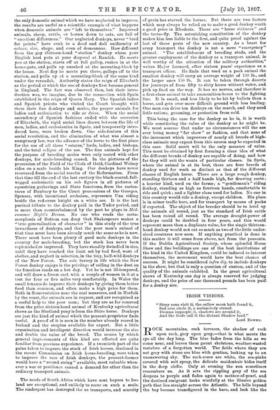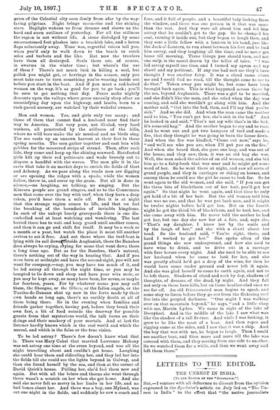IRISH VISIONS.
"Stray suns visit it, the callow moon hath found it, Sad seas circle it, a melancholy strand.
Dreams impeople it, shadows are around it, And the Gods call it the distant Shadow land."
Lord BowaN.
ROCK mountains, rock terraces, the shadow of rock upon rock, grey upon grey,—that is what meets the eye all the day long. The blue fades from the bills as we come near, and leaves them gaunt skeletons, weather-wasted vertebra3 of a forgotten world. The fields where they are not grey with stone are blue with gentian, looking up to an unanswering sky. The rock-roses are white, the sea-pinks covered with salt spray, the delicate maidenhair hides itself in the deep clefts. Only at evening the sun sometimes remembers us. As it sets the rippling grey of the sea deepens to purple and fades again to mother-of-pearl, and the destined emigrant looks wistfully at the illusive golden path that lies straight across the Atlantic. The hills beyond the bay become transfigured in the haze, and look like the
gates of the Celestial city seen dimly from afar by the way- faring pilgrims. Night brings moon-rise and the shining stars. Daylight wakens us from dreams and shows us the hard and stern outlines of yesterday. For all the stillness the region is not without life. A stone dislodged by some unaccustomed foot plashes into a brackish lake, and a heron flaps reluctantly away. Time • was, regretful voices tell you, when you'd only to walk down to the beach to catch soles and turbots and the like. But now the trawlers have them all destroyed. Seals there are, of course, in swarms in the winter time ; but where's the use IA them ? There's not much luck in killing a seal, but pollok you might get, or herrings in the season, only you must take care to turn something you're wearing inside out before you start in the boat. And if you meet a red-haired woman on the way, it's as good for you to go back ; you'll be sure to get nothing that day. Foxes make nightly descents upon the valleys where geese uneasily sleep after an unsatisfying day upon the highway, and lambs, born to a rock-paved nursery, are watched by their wakeful owners.
Men and women. Yes, and girls only too many ; and those of them that cannot find a husband must find their way to America. Not very poor, not ill-clad, very hard workers, all penetrated by the stillness of the hills, where no wild bees make the air musical and no birds sing. The sea casts up an unsown harvest at their feet in these spring months. The men gather together and cast lots with pebbles for the measured strips of strand. Then, after each tide, they come and heap up the shining seaweed. Barefooted girls kilt up their red petticoats and wade bravely out to dispute a handful with the waves. The men pile it in the carts that take it on market days to enrich the fields of Gort and Athenry. As we pass along the roads men are digging -or are opening the ridges with a spade, while the women follow, throw in, and cover up the grain. But all is done in silence,—no laughing, no talking, no singing. But the Kinvara people are grand singers, and as to the Connemara men that come over the bay with turf, when they have a drop taken, you'd hear them a mile off. But it is at night -that this strange region comes to life, and that we feel the breaking of the boundaries of invisible kingdoms. In each of the unkept lonely graveyards there is one dis- embodied soul at least watching and wandering. The last buried there has to wait and keep guard until another comes, and then it can go and shift for itself. It may be a week or a month or a year, but watch the place it must till another arrives to set it free. And out there where the turf-boat is lying with its sail downtaittside Aughanish, there the Banshee does always be crying, cl•ying for some that went dowm there a. long time ago. But as for the Banshee, that's natural, there's nothing out of the way in hearing that. And if you were born at midnight and have the second-sight, you will not want for company,—nay, you may have too much of it, and be led astray all through the night time, or you may be tempted to lie down and sleep and have your wits stole, or you may be kept away, as many have been, for seven, or maybe for fourteen, years. For by whatever name you may call them, the Sheogne, or the Others, or the fallen angels, or the Tuatha-de-Danaan shut up now in the forts made by their own hands so long ago, there's no earthly doubt at all of them being there. So in the evening when families and friends gather together, having put, before they break their own fast, a bit of food outside the doorway for possible guests from that mysterious world, the talk turns on their doings and their mockery of poor mortals. And at last the listener hardly knows which is the real world and which the unreal, and which is the false or the true vision.
To be led astray ? There's few doesn't know what that is. There was Mary Cahel that married Lawrence Mahony was set astray one time at the cross beyond, and was all the night travelling about and couldn't get home. Laughing she could hear them and ridiculing her, and they led her into the fields till she could see the lights beyond in Galway, and then she found herself by the sea, and then at the corner of David Quirk's house. Pulling her, she'd feel them now and again. But with all the briers and thorns she went through there wasn't a scratch on her when she got home. And she -said she never felt so merry in her limbs in her life, and no bad bones about her. And there was a boy, one Myland, was out one night in the fields, and suddenly he saw a coach and
four, and it full of people, and a beautiful lady looking from the window, and there was one person in it that was more than the rest. And they were all about him and led him astray that he couldn't get to the gap. So he changed his coat, turning it inside out, but they began to laugh then, and they sent a little fellow with a lantern in his hand, just like the Jack-o'-Lantern, to ran about between his feet and to lead him astray, and they laughing all the time, and he never got home till morning. Three things you should turn, and not one only, is the moral drawn by the teller of tales. ".1 was led astray myself one time, and I turned ray apron and my shawl and my petticoat. If any one had met me they'd have thought I was another fairy. It was a cloud came about me and I could find no road, till the thought came to me to do that." Taken away you might be, but some have been brought back again. This is what happened across there by the sea, beyond Aughanish. There was a girl to be married, and she didn't like the man, and she cried when the day was coining, and said she wouldn't go along with him. And the mother said, "Get into the bed, then, and say that you're sick." And so she did. And when the man came the mother said to him, "You can't get her, she's sick in the bed." And he looked in and said, "That's not my wife that's in the bed, it's some old hag." And the mother began to cry and to roar. And he went out and got two hampers of turf and made a fire, that they thought he was going to burn the house down. And when the fire was kindled, "Come out now," says he, "and we'll see who you are, when I'll put you on the fire.' And when she heard that, she gave one leap, and was out of the house, and they saw, then, it was an old hag she was. Well, the man asked the advice of an old woman, and she bid him go to a fairy-bush that was near and he might get some word of her. So he went there at night, and saw all sorts of grand people, and they in carriages or riding on horses, and among them he could see the girl he came to look for. So he went again to the old woman, and she said, "If you can get the three bits of blackthorn out of her hair, you'll get her again." So that night he went again, and that time he only got hold of a bit of her hair. But the old woman told him that was no use, and that he was put back now, and it might be twelve nights before he'd get her. But on the fourth night he got the third bit of blackthorn, and he took her, and she came away with him. He never told the mother he had got her, but one day she saw her at a fair, and, says she, "That's my daughter, I know her by the smile and by the laugh of her," and she with a shawl about her head. So the husband said, "You're right, there, and hard I worked to get her." She spoke often of the grand things she saw underground, and how she used to have wine to drink, and to drive out in a carriage with four horses every night. And she used to be able to see her husband when he came to look for her, and she was greatly afraid he'd get a drop of the wine, for then he would have come under ground and never left it again. And she was glad herself to come to earth again, and not to be left there. Shadows of cloud and rock by day, shadows of thoughts, of dreams, of the dead, by night. And they fall not only on these bare hills, but on those heather-clad ones we see far off. An old frieze-coated man begins to speak, and some stay to listen before they go out from the flickering turf fire into the peopled darkness. "One night I was walking over on that mountain beyond," he says, "and a little chap with me, Martin Lydon. We came in sight of the lake of Derrykeel. And in the middle of the lake I saw what was like the shadow of a tall fir-tree. And while I was looking, it grew to be like the mast of a boat. And then ropes and rigging came at the sides, and I saw that it was a ship. And the boy that was with me, he began to laugh. Then I could see another boat, and then more and more till the lake was covered with them, and they moving from one side to another. So we watched them for a while, and then we went away and left them there."



































 Previous page
Previous page